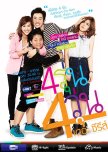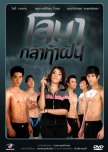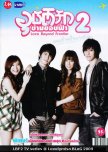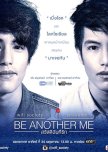- Español
- ภาษาไทย
- Русский
- Português (Brasil)
- Título original: รัก มาก เธอ
- También conocida como: I Love "A Lot Of" You , I Love a Lot of You , Rak Mak Ter , Rak Mak Thoe
- Guionista: Gun Supalerk Ningsanon, Lemon Waneepan Huaphoklang, Wipada Weanpetch
- Guionista y Director: Lung Jitaporn
- Géneros: Comedia, Romance, Drama
Dónde ver I Love "A Lot Of" You
Gratis (sub)
Reparto y créditos
- Mind Atitaya TribudarakSairung | Fahsai | Praifon | Storm | MarnmokPapel principal
- Nanon Korapat KirdpanSunPapel principal
- Junior Panachai SriariyarungruangPhatPapel secundario
- Parn Nachcha ChuedangGudjiPapel secundario
- Louis Thanawin TeeraphosukarnDebut / "De"Papel secundario
- Yutthana BoonaomThepphachai [Sairung's father]Papel secundario
Reseñas

This review may contain spoilers
"I Love 'Some' of You—But Not All"
Wow, what a journey this series was! GMMTV's "I Love 'A Lot' Of You," emphasizes (if not outright shoves down our throats) the importance of sincereity, not only in how we approach others, inform our behaviors, but also in how we view ourselves; every life experience we go through is an opportunity to showcase our true selves unapologetically, no matter how that manifests, no matter the consequences. And while this show shines in the ideology of the message, the meaning of the show is unraveled in its handling of core plotlines, particularly the one surrounding mental health and Dissociative Identity Disorder (DID).The show is centered around the premise of a woman with 5 different personalities (Mahnmook, Sairung, Storm, Prai-fon, and Fah-Sai) who first meets Sun under the guidance of Sairung's father (while I recognize the complexity of identity, for the purposes of this review, I will refer to Mind's character as Sairung), who wants Sun to "heal" her from her DID. The conversations around DID in the series not only consistently but also explicitly regard DID as a weakness that needs to be healed, which both undercuts the series' main emphasis on sincerity and also advocates a dangerous oversimplification of the condition. The idea that DID can be "overcome" with something as simple as being loved (if that's the case, then why wasn't her father's love enough to "heal" her) and the disregard for the complexity of each personality frankly stunned me. The series tries to circumvent this oversimplification in the end by showing how Sairung still carries a part of each personality, but it doesn't make up for the fundamental contradiction in the show's message; if we are to celebrate each and every part of ourselves to be sincere, then why not celebrate the complexity of ourselves by having Sairung end up balancing all 5 personalities equally? Each personality makes up who Sairung is; Sairung is Sairung because she was made up of 5 different personalities.
So, what this show ultimately ends up doing in this reduction of DID and identity, is it advocates a dangerous caveat to the message of sincerity. It's true that we should strive to be ourselves, but we should only do this when who we are is something to be desired. We should show parts of ourselves to others, but only the parts others can accept, which is an ultimately damaging view of identity and individuality, because if we are meant to pander to the wishes of others, then who and what is our true, authentic self?
This harmful portrayal of identity is further developed in the subplot of Sairung wanting Sun to choose which personality she ultimately ends up choosing once she "heals" from DID, which is ironic because sincerity is something deeply rooted in understanding and knowledge of ourselves, not something others ascribe to us; we cannot be sincere about our feelings and identity if we aren't familiar with the complexity of the wholeness of ourselves, or if someone else tells us who we are. If Sairung, as a character, were fully sincere, then why would she want someone else to choose the person she would continue to live as? Again, the show tries to circumvent this harmful narrative by ultimately having Sairung pick her own personality, but it is precisely the mere inclusion of this subplot in a show that advocates for the importance of authenticity in expressing our individuality that is harmful. So, while this show presents a performative attempt to open the door to more genuine, productive conversations regarding DID and mental health, an issue historically underrepresented in Asian culture and media, I can't help but walk away from this series thinking it has done more harm than good.
I think the premise of the show is a very interesting one, the cast (Mind killed this role!) was amazing, the soundtrack was beautiful, and the production quality was great, however, it is with this fondness of the show that I say there were just so many other aspects of the show that I thought could've been better done, such as with the utter lack of zero secondary character development, De's character being a creep that uses spyware whenever he wants and without others' permission, and the hurried handeling of the Kritsana Real Estate plotline (did we ever truly learn what/how the business was shady?).
In the end, "I Love 'A Lot' Of You" sets itself up to be a heartfelt meditation on sincerity and identity, but ultimately falls apart under the weight of its own contradictions due to its failure to fully embrace the very sincerity it preaches. If you are someone looking for a quick and easy watch, this might be up your alley! But if you're someone looking for a little more depth and "sincerity" than just a surface rom-com, I would suggest you get your fix somewhere else.
¿Te ha parecido útil esta reseña?

Sun isn't the jerk here, Sairung's father is.
I'm not really sure how to rate this series, I did sit through all 12 episodes in one sitting, no pauses, no breaks I just sat and watched, so I can't say I completely hated it in fact I did enjoy some of it.Sadly although an easy watch, this series makes very little sense starting from the fact that the plot consists of a girl who's suffered such trauma after her mother's passing that has caused her to develop 5 distinct personalities so her father has the genius idea to hire a jerk who's main source of income comes from tricking women into falling for him only to then mercilessly break their hearts, a job he's quite proud of and enjoys maybe too much. What kind of father would do such a heinous thing to their own daughter and why?? According to him if all 5 personalities fall for the same man they'll merge into one and all of his daughter's issues will go away. Whatt??? How!!!!??? Where did he get such a stupid idea from? What is he basing this tactic on? Not even he knows!! Father of the year right here. And I'm not even going to get into episode look, 11 I don't know anything about psychology but I can assure that that is not how DID works.
The good things, the things I stayed sat though 12 episodesof nonsense, The main actress Mind, gorgeous woman btw, did a great job portraying the 5 personalities, each had their own style, speech pattern and mannerisms to the point that one could easily tell who was on screen. Nanon who I usually associate with soft baby girl type characters that cpuld do no wrong did make this jerk heartbreaker jackass come to life, I kind of wanted to slap him a couple times and smiled ear to ear when eventually he did get slapped.
The rest of the cast was cute and they made what was a total mess enjoyable but at the end of the day it's a really dumb series that doesn't have much of a story.
If you're watching this waiting for it to make sense, don't bother but if you're a Nanon fan and want something to pass the time you might like this.
I'm rating it a 5 trust me it's not good but not entierly bad either.
¿Te ha parecido útil esta reseña?






















































